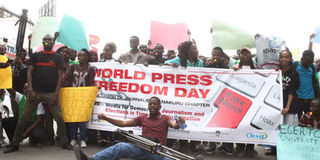Media the playmaker a coach can’t ignore

Journalists pass along Kenyatta Avenue in Nakuru town in a procession to mark the World Press Freedom Day on May 3, 2019. PHOTO | FILE | NATION MEDIA GROUP
What you need to know:
- The Covid-19 disruption poses grave danger to an industry reeling from technological changes that have altered business models and punctured revenue streams.
- Journalists have a right to a decent job, for the realisation of the United Nations Sustainable Development Goal No.8.
The world marks World Press Freedom Day (WPFD) to celebrate the unrivalled role of the Fourth Estate, identify the media sector’s milestones and reflect on the obstacles journalists face in the line of duty.
“Journalism without fear or favour”, the theme of this year’s WPFD, which was marked on Sunday, summarises journalists’ obstacles to serve public interest. But the day was marked in an unprecedented environment as the global media, like other sectors, suffers an assault from an indiscernible enemy: Coronavirus.
The threats to media freedom have been business interests, government, politicians, underworld gangs and law enforcers. Interestingly, none has been spared by this virus that has top scientists grappling with a cure or even vaccine.
The Covid-19 disruption poses grave danger to an industry reeling from technological changes that have altered business models and punctured revenue streams.
PARADIGM SHIFT
However, President Uhuru Kenyatta administration’s listing of the media among the frontline players in the war against the pandemic underscores its key role.
This is akin the football playmaker, whose actions on the field affect the overall performance of the team. Its key role, informing the public and rallying the country to a public cause for the national good, cannot be gainsaid amid an ‘infodermic’. The acknowledgment of journalists not as mere producers of “meat wrappers” provides a paradigm shift in how the sector should be treated now and in future.
With the immense job losses and now the new song in the market, pay cuts, there is a need for collective effort in developing a recovery strategy to put the industry back on a growth trajectory. A strong media will equally complement the overall reconstruction plan for the post-Covid-19 economy.
The pandemic can only act as a wake-up call to the government, investors and development partners to prioritise stimulus packages, if not heavy investment, to turn around the fortunes of the sector to play its rightful role.
Apart from threats to press freedom, economic challenges remain the biggest obstacle to journalists’ quest for independence. A revised version of a famous quote by African freedom, “See ye economic freedom and all shall be added unto you”, remains relevant.
FREE MEDIA
Journalists have a right to a decent job, for the realisation of the United Nations Sustainable Development Goal No.8. Having jobs that are productive provides a fair income, ensures social protection for families and promotes personal growth, which helps to guarantee a pool of reliable and professional manpower for the media sector.
The latest press freedom index ranks Kenya at position 103, from 96 last year. This is because major factors critical to a free media have been ignored over the past seven years.
For instance, there has been zero government investment in media development when the sector’s role is critical in playing its watchdog role. And while journalists’ associations went out of their way to conduct media literacy forums with consumers and opinion leaders, the sector’s crucial role was under attack prior to Covid-19.
Mr Oduor is the secretary-general, Kenya Union of Journalists (KUJ). [email protected].





